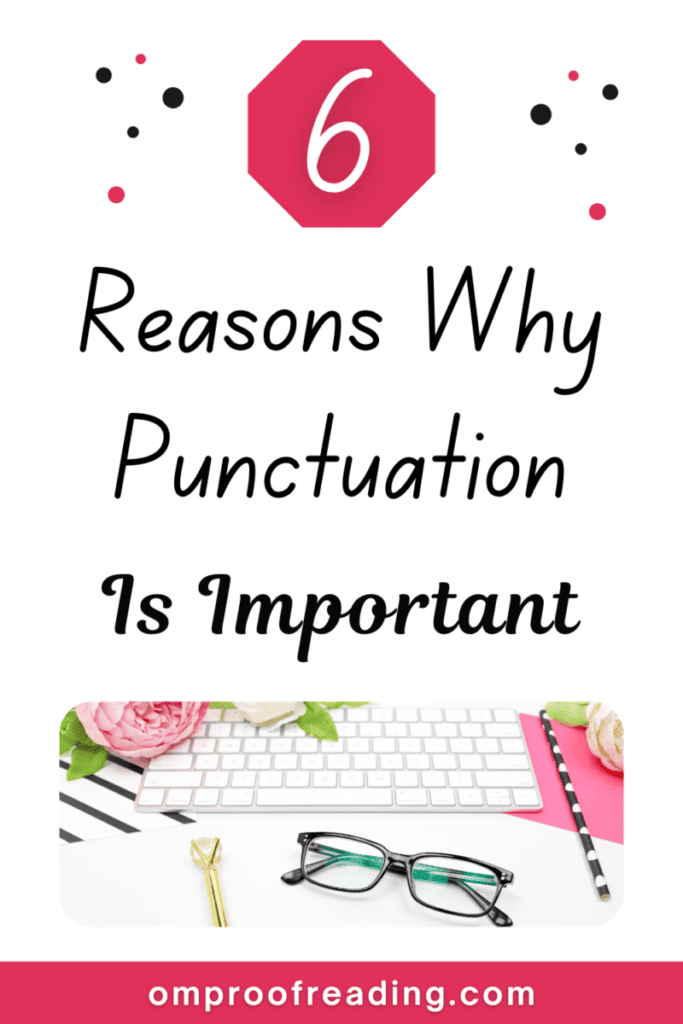This article may contain affiliate links. Please see our affiliate disclaimer in the footer menu for more information. Thank you for your support!
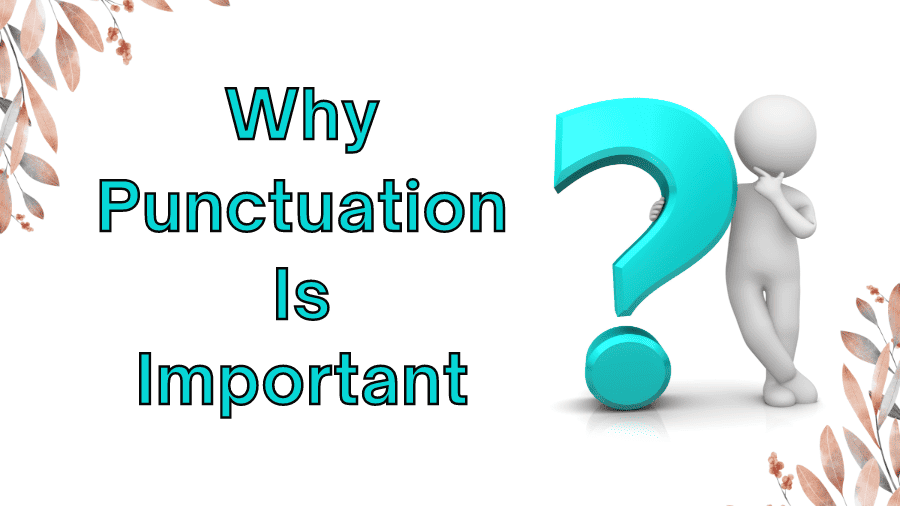
Punctuation is important because it enables us to communicate our message clearly and effectively. Without punctuation, we wouldn’t understand how units of a sentence relate to one another or how the writer intends for us to read what they’ve written.
Let’s discover six reasons why punctuation is crucial in written communication.
Why Punctuation Is Important in Writing
Before we get into the importance of punctuation, let’s get an expert definition of what it means.
“Punctuation is the act or practice of inserting standardized marks or signs in written matter to clarify the meaning and separate structural units.”
– Merriam-Webster Online Dictionary
I bet you’re glad this practice exists. I sure am! 😊
Now let’s see the reasons why punctuation matters.
1) Correct punctuation ensures clarity.
Clarity is critical to make sure our message isn’t misinterpreted. Sometimes, a misunderstood message isn’t a big deal. Other times, the consequences can be detrimental.
Check out the video below to see how a missing comma cost a company five million dollars.
Comma catastrophes are real!
An article titled The Law and Punctuation on the Library of Congress Blogs website details the incident discussed in the video.
The post points out that punctuation can influence how a law is interpreted.
Let’s see another example of comma chaos.
The two sentences below demonstrate how a missing comma can cause confusion over one’s marital situation.
Sentence 1: Carla had a conversation with her husband, Bob.
In this sentence, a comma comes before the word Bob. This lets us know that Bob is an appositive.
An appositive is a noun or noun phrase that identifies or describes another noun or noun phrase beside it.
In our sentence, the appositive Bob is a noun that sits next to (and identifies) the noun phrase her husband.
her husband = Bob
A comma sets off the word Bob from the rest of the sentence because it’s nonrestrictive (nonessential) information. The name Bob isn’t essential because Bob is Carla’s only husband.
But the next sentence takes on a vastly different meaning when we leave out the comma.
Sentence 2: Carla had a conversation with her husband Bob.
Yikes! Astute readers realize what this sentence means.
In this sentence, no comma comes before Bob. That means that Bob isn’t an appositive.
Since no comma sets off the word Bob, we know that Bob is restrictive (essential) information, letting us know who her husband is referring to.
This means that Carla has more than one husband.
I wonder how many other husbands she has.
I wonder if Bob wonders how many other husbands she has. 😉
2) It helps the writer convey a particular tone.
Punctuation aids in imparting tone.
“When speaking aloud, you punctuate constantly—with body language.
Your listener hears commas, dashes, question marks as you shout, whisper, pause, wave your arms, roll your eyes, wrinkle your brow.
In writing, punctuation plays the role of body language. It helps readers hear the way you want to be heard.”
– Russel Baker
For example, an exclamation point transmits a specific tone. Depending on the context, it can communicate various emotions, including excitement, surprise, or enthusiasm.
To convey an informal tone, we can employ a period after a sentence fragment.
However, formal writing demands that periods are only used after complete sentences.
3) It makes the reading experience more enjoyable.
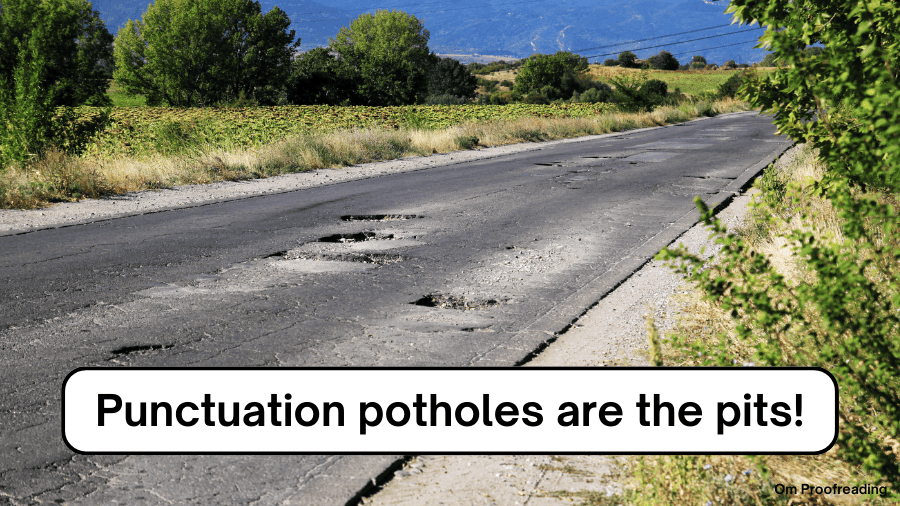
Punctuation pitfalls can confuse readers and distract them from an otherwise enjoyable experience.
When you’re reading, you want to do so with ease. You want to take in meaning effortlessly. You want your experience to flow without falling into punctuation potholes.
Well-punctuated prose isn’t ambiguous. It doesn’t cause the reader to pause and ponder what the writer meant.
For example, think about the following sentence:
Sentence 1: The ill mannered woman was seated at the largest table.
Am I talking about a woman who is ill (sick) and mannered (i.e., possessing particular manners)?
Or am I referring to a lady who has bad manners?
Now consider this sentence:
Sentence 2: The ill-mannered woman was seated at the largest table.
Here, I’m undoubtedly talking about a female whose manners are missing. The hyphen shows you that the words ill and mannered are connected.
Although you likely thought this second sentence was what I meant to begin with, you may have stumbled for a second.
Another example of a subpar reading experience is when writing is littered with unnecessary commas.
It feels like, you constantly, need to stop, and then start, reading again. 😉
Talk about a lack of flow. That comma-heavy sentence makes me feel like I’m in a bumper car when I want to be in a go-kart!
4) Proper punctuation protects a writer’s reputation.
Poor punctuation is a sign of careless work.
Who is willing to trust a careless person?
Suppose you saw a website with punctuation errors on the landing page.
You may be interested in the product or service they’re pedaling, but would you trust the quality of their service or product if they didn’t bother to pay attention to the punctuation in their website copy?
Wouldn’t you conclude that they probably didn’t put much effort into developing their product or that they’d be just as careless with the service they offer?
Precise punctuation is also an integral part of netiquette (internet etiquette).
Punctuation that misses the mark (yes, that was a purposeful pun 😉) is off-putting and is usually a red flag.
Attention to detail is vital.
Would you hire a lawyer who lets the details slide?
How about a surgeon who ignores the little things?
No, thank you!
Whether we like it or not, people pay attention to our punctuation.
5) It allows the writer to guide readers.
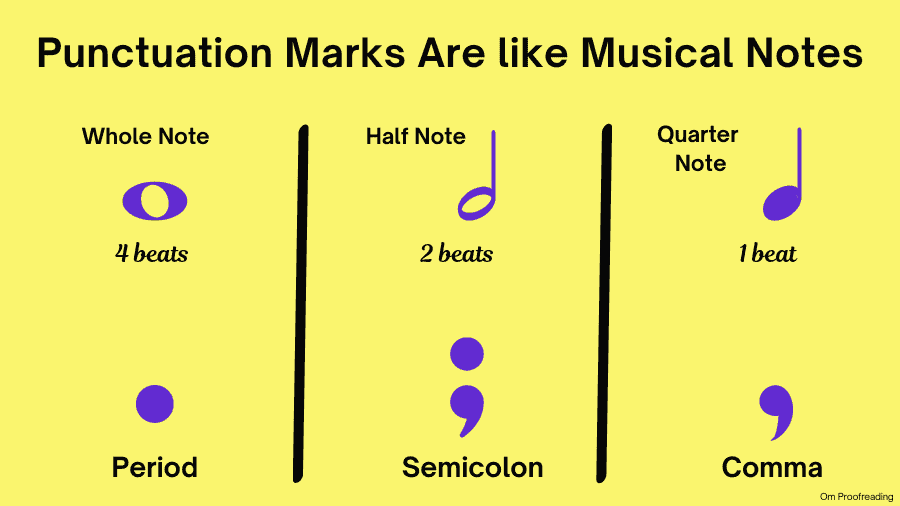
Punctuation structures our writing so that readers can navigate it properly.
“Punctuation marks are the traffic signals of language: they tell us to slow down, notice this, take a detour, and stop.”
– Lynne Truss, author of Eats, Shoots & Leaves
Punctuation permits the writer to pilot the pacing of prose.
If periods, commas, and semicolons were musical notes, I imagine they’d say the following:
Period: I’m a whole note.
When you see me, come to a complete stop.
Semicolon: I’m a half note.
Pause briefly when you spot me.
Comma: I’m a quarter note.
Take the slightest break whenever I appear.
Punctuation also allows the author to guide readers by indicating that someone is being quoted or that certain words are direct speech.
Of course, they show these scenarios by using quotation marks.
Every punctuation mark has a purpose, so the author can use them accordingly to shepherd the reader through their writing.
Finally, in case you’re an anatomy aficionado, I’ll leave you with this point to ponder:
“Punctuation is to words as cartilage is to bone, permitting articulation and bearing stress.”
– John Lennard
6) It can improve the aesthetics of writing.
Consider a blog post that’s formatted with large blocks of text. All you see is lengthy paragraphs with no space between them. Without sufficient white space, writing looks unappealing.
Like white space, punctuation makes our prose look pretty on the page.
For example, I often use bulleted and numbered lists in my blog posts.
These bullet points and numbers help to vary the formatting and make my writing (hopefully) easier on your eyes.
Utilizing these lists is an aesthetically pleasing way to spread one’s thoughts across a page.
For example, to indicate a list, I could write it this way:
Sentence 1: Her favorite activities include the following: babysitting, biking, and hiking.
Or I could opt to express myself with a bulleted list.
Sentence 2: Her favorite activities include the following:
- babysitting
- biking
- hiking
Which sentence do you prefer?
Although the first sentence is fine, I think many people appreciate occasionally seeing the kind of punctuation in the second sentence.
Using a variety of punctuation marks makes our writing more attractive.
Before concluding, we need to remember that punctuation rules vary according to the style guide being used. Different genres of writing follow different style guides.
Finally, remember to proofread your work to ensure your punctuation is on point.
Frequently Asked Questions
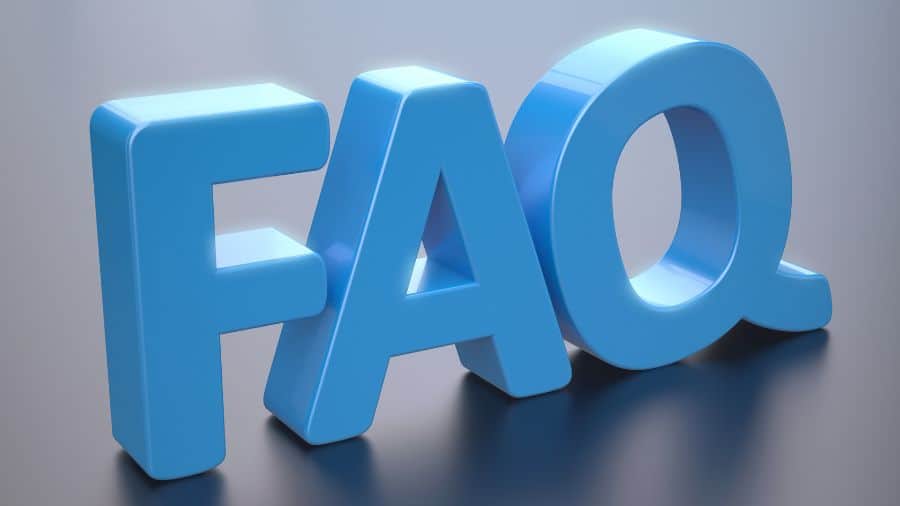
What would happen without punctuation?
Without punctuation, reading would be confusing and frustrating—like driving in an area devoid of street signs. We wouldn’t have any guidance for navigating sentences, and misunderstandings would be commonplace. Meaning would be mangled, clarity crushed, and pacing pulverized.
Imagine the previous paragraph without periods. Without punctuation, we could no longer communicate our ideas effectively and efficiently. And it would suck much of the joy out of the reading experience.
Why are punctuation and correct spelling important?
Proper punctuation and spelling make writing clear and consistent, enabling readers to focus on our message rather than stumbling over slipups. These elements ensure our words communicate the meaning we intend. They preserve our professionalism and show we respect the readers’ time.
Om Proofreading talks about improving your punctuation if you’d like some pointers!
Best wishes to you!
“Do not let those who cannot see the truth tell you who you are. You are the flame that cannot be put out. You are the star that cannot be lost. You are who you have always been, and that is enough and more than enough. Anyone who looks at you and sees darkness is blind.”
– Cassandra Clare
